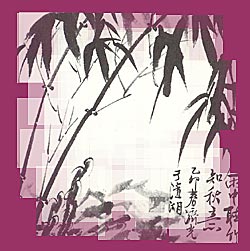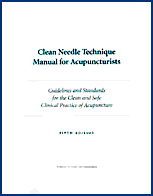American Manual Medicine Association
Clean Needle Technique, Anti Contamination, and Cross Infection
The Michigan Medical Acupuncture Association (MMAA) subscribes to the policies of the American Manual Medicine Association. The AMMA requires that all members limit their practice of acupuncture to the use of sterile disposable needles. These needles are designed for a single use and are commonly available through many acupuncture products vendors. To assure patient safety the AMMA requires that its members complete both the AMMA State Licensure Acupuncture Public Safety Proficiency Certification Examination (SLAPSPCE) and the Clean Needle Practical Examination (CNPE). The AMMA SLAPSPCE contains questions regarding clean needle procedures, needle contamination, and cross infection. The AMMA clean needle and anti contamination and cross infection requirements are based upon well established hospital and medical procedures, specifically recommendations made by the Federal Drug Adminstration (FDA) and the Center for Disease Control and Prevention (CDC).
Clean Needle Technique (CNT) minimizes the possibility of contamination and cross infection.
There are other risks to the performance of acupuncture technique. The most serious is the accidental puncture of an organ or into a body cavity such as the lungs. Though the research on the frequency of accidental cavity and organ puncture is contradictory and inconclusive it is safe to say that organ punctures are not common occurrences within the acupuncture community. However, the risk is even less for the medical acupuncturist using AMMA recommended procedures including the use of sterile disposable needles with insertion points around joints, and not directly over major organs, and primarily for the purpose of pain control and musculo-skeletal therapy.
Other risks of acupuncture treatment may include:
- Nausea
- Dizziness
- Bruising
- Fainting
'Serious adverse effects of acupuncture are rare. Reported accidents and infections to organs or tissues appear to be related to violations of sterile procedure, negligence of the practitioner, or both. A systematic review of case reports on the safety of acupuncture, involving 98 papers published in the English language from 22 countries during the period from 1965 to 1999, found only 202 incidents. The number of incidents appeared to decline as training standards and licensure requirements were enhanced. Among the 118 (60%) reported incidents involving infection, 94 (80%) involved hepatitis, occurring mainly in the late 1970s and early 1980s. Very few hepatitis or other infections associated with acupuncture have been reported since 1988, when widespread use of disposable needles was introduced and national certification requirements for clean needle techniques were developed and enforced as an acupuncture licensure requirement. Because cancer patients who are undergoing chemotherapy or radiation therapy are immunocompromised, extra precautions must be taken and strict clean needle techniques must be applied when acupuncture treatment is given."
"Minor adverse effects of acupuncture, such as pain at needling sites, hematoma, tiredness, lightheadedness, drowsiness, and localized skin irritation, have been reported. These minor adverse effects can be minimized by appropriate patient management, including local pressing and massage at the needling site after treatment."
Outline of Suggested Procedures Relative to Infection Control, Anti Contamination and Cross Infection:
The AMMA recommends that all members acquire and study the book Clean Needle Technique Manual for Acupuncturists available through the National Acupuncture Foundation.

860.455.4424
P.O. Box 137
Chaplin, CT 06235
(The AMMA does not recommend or endorse the use of reusable needles)
Facilities and Treatment Surfaces:
The AMMA recommends that all clinical offices be maintained at a high level of cleanliness and that standard clinical and medical infection controls be maintained. Since most medical and practical acupuncturists work under medical supervision this is normally the case. It is recommended that all treatment facilities have sinks with hot and cold water, disinfectant soaps, and disposable towels easily accessible to the therapist. Treatment tables and surfaces must be frequently cleaned with detergents and hot water and then protected by sterile table or equipment coverings.
Records:
Standard medical recordkeeping is required by the AMMA and must include the patients name, address, telephone number, as well as, the date and details of the treatment provided to the patient.
Procedure:
(AMMA Members are restricted to the use of sterile disposable needles only)
|

